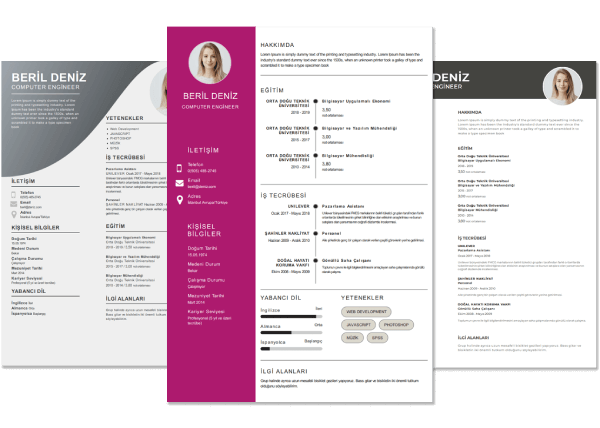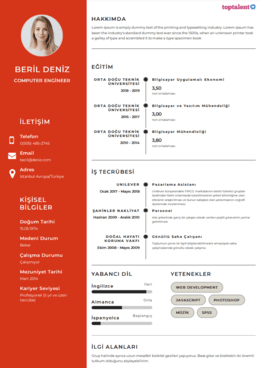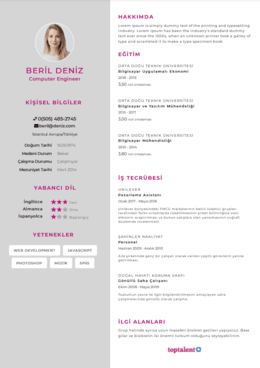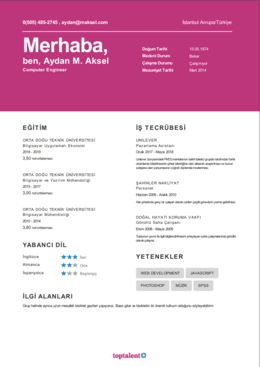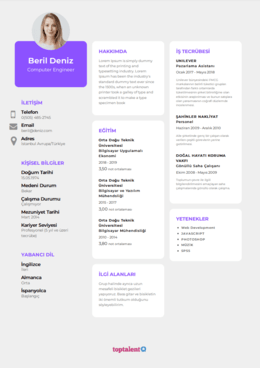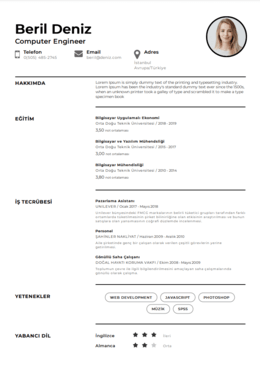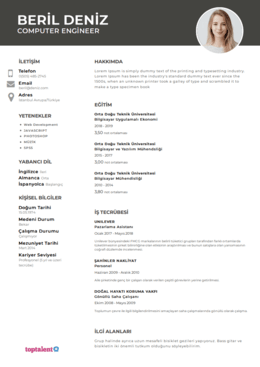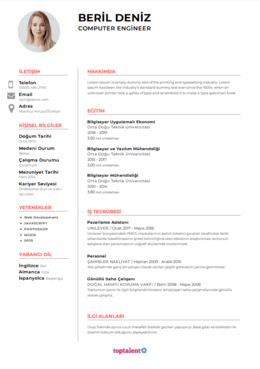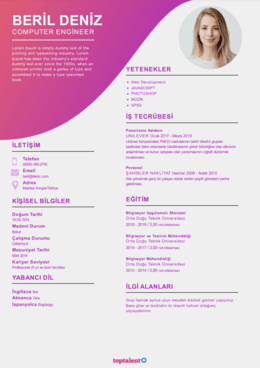Resume Help Emine Oflaz
How Long Should a Resume Be? Ideal Length & Number of Pages
Yeni CV örneklerini inceleHow many pages should a resume have? It depends, according to some specialists who suggest "1 page." Why the uncertainty?
Things shift. We formerly used fax machines. Pages would disappear like socks in a dryer. Email is widely used today. Longer resumes can be submitted more easily thanks to applicant tracking systems.
Which doesn't mean our resume length is arbitrary like it is in the Wild West!
You still need to make an impression on the hiring manager quickly, and you should demonstrate your accomplishments. Let's finally determine the ideal resume length.
- This manual provides responses to:
- How many pages should a resume have?
- How many pages ought a CV to contain?
- When should a resume travel back in time?
How Long Should a Resume Be?
Depending on your degree of experience, an excellent resume should be one to two pages long.
See the table below for further information.
It won't specify the precise length that each resume needs to be. That being stated, a fast scan should help you determine the length of your resume.
Question and Response
How many pages should a resume have?
For most candidates, 1 page
How many pages ought a CV to contain?
1-2+ pages (based on experience)
Why length of resume matters
conveys experience level
Are one-page resumes necessary?
Yes, for 7 years of experience.
How many pages may a resume have?
In rare circumstances, 10 pages
When should a resume travel back in time?
a little bit more than the job offer claims
What is the ideal CV length?
no more than two A4 pages (for most candidates)
Resume Length Facts
The ideal response regarding how long a resume can be in the modern hiring process is that it should be as brief as possible while still demonstrating your value.
The majority of job applicants will just need one page. Anyone with fewer than 7–10 years of relevant experience must agree with that.
How many pages ought a CV to contain?
Most resumes should be one page long, while a handful should be two pages or longer. It depends on the opponent you're facing.
Use one page if someone else can demonstrate their qualifications for the position in one. Need further evidence of your outstanding accomplishments? Use 2+.
Resume length: What it means and why
Why does resume length matter? Consider that you are a manager of sales. You've worked two jobs and accomplished seven truly amazing things. (Example: Revenue doubled in five years.) All of it ought to be covered in a single page. Less words, more "wows."
Are one-page resumes necessary?
One page is not a requirement for resumes. What if you have hundreds of achievements that are too numerous to list? You are a project manager, for instance. 35 different projects that you've worked on each have their own notable accomplishments. Nobody will criticize you for having a 3-page résumé.
How many pages may a resume have?
One or two pages are acceptable for a resume. But is a three-page résumé excessive? A four-page résumé is possible.
Have enough singular accomplishments in a comparable field to cover four pages without repetition? And are they all impressive? Make your resume lengthier.
So, how long exactly is a resume?
Unsure about the length of a resume? Good. Here is the conclusion. Don't worry about resume length.
Concentrate on tailoring your resume to the job offer and demonstrate your suitability for the position by listing relevant achievements. Accomplish it if you can do it on one page. Add more accomplishments if a single page makes you appear underqualified for this particular career.
For jobs requiring a ton of experience, a CV should go back further. Don't add 20 years of experience if the job description reads "3-5 years of experience essential." According to certain studies, candidates who are overqualified might find it more difficult to land a job. List only pertinent experience in either case.
How long should a college resume be?
How long should a college student's résumé be? A two-page résumé or more is required if you have solved Fermat's final theorem, invented fusion in a lunchbox, and logicked a dragonfly's wings off. For the rest of us, a one-page resume sample will do.
Helpful hint: How long should your cover letter be? Although there are some rather significant exceptions, 2/3 of a page is ideal in most situations. See our advice on appropriate cover letter length here.
Resume Length Perfected in 3 Easy Steps
How do you determine the ideal length for your resume?
It won't matter if your resume is one page, two pages, or longer as long as you adhere to the standards for resume length listed below. Why?
Because your resume will automatically control its length like a thermostat for your job search.
Maintain momentum
JFK said, "Do not inquire how long a CV should be." how can you keep it interesting, though? Avoid getting bogged down in lengthy descriptions of duties. Managers frequently skim resumes in less seven seconds, according to HR statistics research. Be succinct and focus only on achievements.
Maintain Relevance
Have I previously said this? It has to be real. Never include anything on your CV that won't impress the recruiting manager.
Create a résumé with accomplishments that show you've essentially already nailed the position. Your resume will remain concise and interesting if you do that.
Constrain, Constrain, Constrain
Avoid achieving the same thing repeatedly. Mentioning that you trained 20+ people in methodologies like Lean, Agile, and Six Sigma is preferable to saying that you trained 5 employees in Lean Principles, 2 in Agile, and 15 in Six Sigma. One bullet point is used for that.
Use Margins, Font, and Spacing, but Don't Overdo It
Yes, you can reduce the font size on your resume and change the margins and line spacing. But don't abuse the design of your resume to the point where it resembles a blank piece of paper. Instead of intimidating the hiring manager with a wall of words, a little more resume length is acceptable.
A Short List of Outstanding Achievements Outweighs a Long List of Duties
Here's a tip for writing a resume: Don't list all the things you were in charge of. That will not only lengthen your resume but also make it uninteresting.
Better than "In charge of inventory management" is "Cut inventory costs by 35%." Therefore, thoroughly study the job description before listing achievements that are appropriate.
How many bullet points should a resume have per job?
Your resume's work experience section should include 3-5 bullet points for each employment. Make each one 1-2 lines long. Do you actually have 30 lines worth of noteworthy accomplishments for each job? Then you require a 2-page résumé. Keep them pertinent to this specific offer, please.
Helpful hint: Are you top management, a project manager, or an engineer? Longer resumes are ideal for any position where your extensive experience makes you a better fit. Just be sure to keep it pertinent and build it on accomplishments.
What's the Perfect Resume Length?
There are many responses when you search "How many pages should a resume be." Keep in mind the following important advice:
The length of a resume increases as more experience is needed. A 2-page CV is acceptable for positions that require 7+ years of experience.
Most applicants should limit their resumes to one page. It all comes down to how many distinctive, outstanding, connected accomplishments you have under your belt.
How long should a resume be? Per job, create 3-5 bullets. Except for senior-level management positions, go back ten years. Adjust your resume to the requirements of the position. The question resolves itself if you do.

